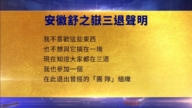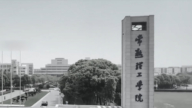【新唐人2011年10月7日訊】大陸兩代相聲演員姜昆與郭德綱互相暗諷,成為最近藝術圈的笑柄。姜昆質疑郭德綱在道德和倫理上出現問題。對此,郭德綱不僅在網絡上回擊,更以打油詩回應。外界認為口水仗,歷來是娛樂圈的重頭戲。但藝術學者認為,需要改革的是制度。請看報導。
9月28號,姜昆參加“2011廣州市高級文藝人才理論研修班”講座中說,“現在郭德綱在網上鬧那麼多事情,在道德、在倫理上,出現這麼多問題,我搞不懂為甚麼那麼多人喜歡他?”
郭德綱作了首詩隱晦的表態,詩的開頭寫道:“楚河兩岸硝煙障,從來暗箭起同行”。
中國藝術研究院學者吳祚來認為,現在中國的體制問題,致使同行造成誤解,互相打擊。
吳祚來:“這個國家應該怎樣去保全這個藝術是個很大的一個問題。一個方面是不讓人家去分兩批,不要讓這些有才華的藝術家去當官。或者有在制度上不要去害這些有才華的藝術家。另外,你對於民間藝術家,你如果希望他高雅起來,你應該給他基金扶持。所以國家這個制度,文化政策有很大的問題。需要改革的是制度,這兩個人頂吵實際上是必然的,也是沒有太大的意義。”
10月3號,郭德綱在單口相聲《濟公傳》的演出中,藉濟公之口再度回應此事。當時,郭德綱正講起濟公要給宋高宗和太子治病時,他突然說道,“這時一個太監指著濟公說:你道德上有問題!濟公回頭說:’這是哪個太監說的!”頓時,聽出弦外之音的觀眾在劇場“噫”聲一片。
大陸詩人、文化評論家葉匡政認為,郭德綱講的非常對,本來相聲作為喜劇裡的一種形式,應該針對社會權力意識批判,才能被民眾喜歡。
葉匡政:“因為喜劇裡原來包括相聲也好,或者各種喜劇的方式,他都會對這種權力的批判,表示對權利的批判、諷刺,對權貴的這種批判,應該講是一個非常重要,在中國裏,尤其是這種極權比較濃厚的國度,應該說是它的主要一個方向。也就是講,民眾之所以歡迎喜劇,是因為它們在,我們看的很多聲音都有它背後的批判。”
葉匡政表示,中國現在為甚麼相聲走向沒落,很大一個原因是中共當局維護唱讚歌的演員,打壓唱負面的演員。而,藝術研究院學者吳祚來認為,如果藝術家沒有為社會貢獻真正的藝術作品,就是一種犯罪,是一種失職。
新唐人記者秦雪、唐睿、薛莉採訪報導。
”Which Eunuch Said This!”
Insinuation between Jiang Kun and Guo Degang, China』s
crosstalk comedians, has become a subject for laughter
in the entertainment circles.
Jiang Kun questioned Guo Degang』s morality and ethics,
Guo fought back online even posting ragged verse poetries.
Opinions said that bickering has always been a highlight
in the entertainment circles. But art scholars comment that
this reflects the necessity to reform the institution.
At 2011 Guangzhou Seminar of Advanced Theory Training
for Senior Literary And Art Talents on September 28,
Jiang Kun brought up a question,
“Guo Degang has made so much troubles online so far,
on the topics of morality and ethics,
I just don』t understand why so many people like him?"
Guo Degang responded by writing a poem
with the following first two verses:
“Gun smoke screen rose above Chu River banks,
hidden arrows sprayed from peers all along.”
Wu Zuolai, a scholar at China Art Research Institute,
believes that China』s institutional problems
are what triggers the misunderstanding
and mutual attack among peers.
Wu Zuolai: “How to preserve a nation』s arts is a big issue.
Firstly, do not intentionally divide artists into two categories.
Do not turn those talented artists into officers,
but protect them from getting hurt by institutions.
And then, if you want those folk artists to advance,
you should offer funds to support them.
There are some big problems with China』s cultural policies.
It is the institution that needs to be reformed.
The bickering between these two is inevitable,
and yet meaningless.”
Guo Degang responded again in his monologue comic talk
on October 3, with a story about Monk Jigong.
When talking of Monk Jigong preparing to cure a disease
of the Song Dynasty』 Emperor and Prince,
Guo suddenly detoured, “At this moment, a eunuch
pointed at Jigong saying: ‘You have moral problems!’
Jigong turned back saying, ‘Which eunuch said this!’”
The audience uttered a sigh, realizing the implications.
Ye Kuangzheng, a poet and cultural critic, agrees with Guo.
He said that as a form of comedy, crosstalks should criticize
the sentiment of power in society. Only developing
in this direction can crosstalks be liked by civilians.
Ye Kuangzheng: “Many comedy forms, including crosstalks,
originally criticized and satire those in power.
It can be said that this is a very important art form in China,
especially while being a strong totalitarian nation.
That is to say, why are the masses fond of comedy?
Because there is a lot of inner criticism in the crosstalks.”
Ye Kuangzheng comments that crosstalks in China fell into
decline. The main reason is that the authorities of the CCP
(Chinese Communist Party) promote crosstalk comedians
praising CCP , but suppress those critical to CCP.
Wu Zuolai points out that it is a crime and a duty dereliction
for an artist to not be genuine in his art work for the society.
NTD reporters Qin Xue, Tang Rui and Xue Li































